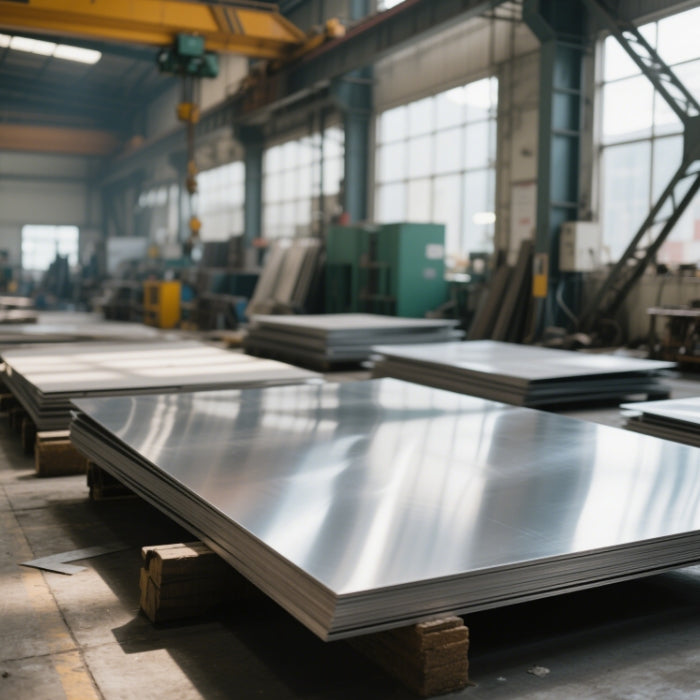StockSteel
Factory-Direct Stainless Steel Metal Plate | 2B/HL Surface & ASTM Spec
Factory-Direct Stainless Steel Metal Plate | 2B/HL Surface & ASTM Spec
Couldn't load pickup availability
Factory-Direct Stainless Steel Metal Plate | 2B/HL Surface & ASTM Spec
Product Specifications
| Attribute | Details |
|---|---|
| Material Grades | 304, 316L, stainless steel divided plate (custom patterns), nickel plated vs stainless steel variants |
| Thickness | 0.3mm–150mm (Customizable) |
| Width | 100mm–3000mm |
| Surface Finish | 2B (smooth matte), HL (hairline), Mirror (8K), No.4, stainless steel suction plate (anti-slip) |
| Hardness (HV) | 150–220 (Annealed), 250–320 (Cold Rolled) |
| Tensile Strength | 520–860 MPa (Grade-dependent) |
| Yield Strength | 205–450 MPa |
| Thermal Conductivity | 15–29 W/m·K |
| Operating Temperature | -50°C to 800°C (Short-term: 900°C) |
| Certifications | ASTM A240, ASME SA240, EN 1.4301/1.4404, ISO 9001 |
Technical Properties
Tensile & Bend Strength
Our ASTM-compliant stainless steel plates deliver exceptional tensile strength (520–860 MPa), ideal for structural applications in corrosive environments. For instance, nickel plated vs stainless steel variants balance corrosion resistance and conductivity, making them suitable for electrical enclosures or marine hardware. Bend strength is enhanced through cold rolling, achieving up to 1.5x higher rigidity than annealed plates, perfect for load-bearing components like stainless steel suction plate systems in industrial vacuums.
Weight Calculation
Calculate weight per unit area using:
Example: A stainless steel divided plate (3mm thick) weighs ~23.8 kg/m². For perforated plates, reduce weight by 15–30% based on open area ratio.
Identification Methods
- ASTM/EN Standards: Laser-etched codes (e.g., "304" or "316L") for traceability.
- Surface Marking: QR codes linked to mill test reports (MTRs) for chemical composition and heat treatment data.
Why Stainless Steel Rusts & Prevention
While stainless steel resists rust through its chromium oxide layer (≥10.5% Cr), specific conditions compromise protection:
- Chloride Exposure: Coastal environments or chemical spills trigger pitting corrosion, especially in nickel plated vs stainless steel with incomplete passivation.
- Mechanical Damage: Scratches on HL finish surfaces expose the base metal to oxidation. Use non-abrasive cleaners for maintenance.
- Galvanic Corrosion: Contact with dissimilar metals (e.g., aluminum) accelerates degradation. Isolation pads or dielectric coatings are recommended.
- Organic Contaminants: Food acids or pollutants degrade the passive layer. Clean biweekly with pH-neutral solutions.
Applications
- Industrial: Stainless steel suction plate for vacuum systems; stainless steel divided plate for food processing separation.
- Architectural: HL finish panels for façades; 2B finish for hygienic surfaces in hospitals.
- Automotive: Nickel plated vs stainless steel components for corrosion-resistant brackets.
Why Choose Our Stainless Steel Plates?
- Factory-Direct Pricing: Eliminate middlemen costs—save 15–30% compared to distributors.
- Custom Solutions: Tailored stainless steel divided plate patterns and suction plate textures.
- Fast Turnaround: 90% of orders ship within 7 days, including perforated and embossed variants.
- Global Certifications: ASTM, ISO 9001, and RoHS compliance for industrial safety.
- Lifetime Warranty: 10-year anti-corrosion guarantee for structural applications.
Why Us?
With ISO 9001 certification and 20+ years of expertise, we specialize in high-performance stainless steel solutions. Our ASTM A240 plates are trusted by Fortune 500 companies for projects demanding precision and longevity—from divided food processing trays to vacuum suction systems. Partner with us for unmatched quality and cost efficiency.

